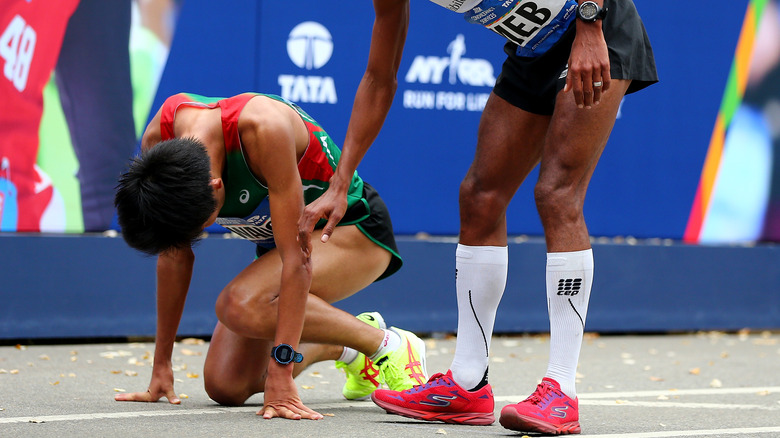How To Handle The Overly Competitive Friend In Your Life
For most of us, we think of a trusted friend as a cheerleader; someone who lovingly pulls us out of a fetal position when we've experienced a breakup, and challenges a pessimistic mindset when we feel hopeless. A true friend urges us toward our personal best while also accepting us at our absolute worst.
But we're complex beings, and varying shades of competition may flare up in relationships. Aside from maybe needing to pulverize others on game night, signs of a competitive friend might be that they feel energized when you share personal bad news, like not getting a raise. When you excitedly reveal that you met the love of your life, an overly competitive friend may become unavailable or offer a muted response at best. Notice if they "match" you — like buying the same expensive item you did. Or if you excel at something, your friend lets you know she's better at it.
We're not sure if relationships with this much cutthroat behavior are actually healthy friendships. However, a little competition isn't always wrong.
Is competition always bad?
Not necessarily. It depends on what's driving it, and competition exists on a spectrum. Per Well + Good, Licensed psychologist Jessica Rabon, Ph.D. suggests that for many, competitive behavior can be situational. She says, "If the individual is in competition about something that is important to them, they are likely going to be more competitive." Building a growth mindset helps us deal better with life's challenges.
On the other hand, professor of management at University of California-Davis Stephen Garcia, Ph.D. says some folks have 'trait' competitiveness. "People who are high in trait competitiveness will tend to perceive a non-competitive situation as being competitive." Like the woman who's furious that a friend at the same restaurant got a better table than her.
Imagine how you might feel when a pal who's also an entrepreneur in a near-identical profession to you, adds clients and income at lightning speed. You may feel like you're lagging behind. If you feel a twinge about your friend's success, but it sparks a fire in you to work hard to become more visible to attract clients, that's healthy competition. You rose to a challenge. Healthy competition can motivate and inspire you to excel past your comfort zone. If instead of a challenge you perceive another's success as a threat, if you flaunt your abilities, withhold important information, publicly criticize or humiliate, or downplay others' achievements, you might be a bad friend. Ouch.
There is such a thing as friendly competition
Professional sports is a powerful arena to help us understand competitive psychology. In a Los Angeles Times article, writer Marianne Szegedy-Maszak notes that in 2005, Philadelphia Eagles football player Terrell Owens was benched during the Super Bowl despite a stellar performance. He was belligerent, demanded attention, said he hadn't received proper recognition for his talent, and "when he thought that other players had been talking about him behind his back, he stormed into the locker room and challenged them to a fight."
However, in the 2022 Wimbledon Women's Semi-Finals match, rivals Ons Jabeur and Tatjana Maria also brought their fierce, personal best to the court, and Jabeur eventually won. Maria said, "On the court, we [both] knew that we will go out and do our best, and after we knew that we were still going to be friends." Off the court, Jabeur is considered an aunt to Maria's children and told the BBC, "I love Tatjana so much, and her family is really amazing."
Similarly, marathon runners Rob Lopez and Jesse Orach were neck-and-neck competitors at the 10-kilometer TD Bank Beach to Beacon race in Maine. Per the Press Herald, steps from completing the marathon, Orach collapsed. Lopez picked him up and ran Orach across the finish line, handing him the win. There's a paradox built into a professional competition: winning and good sportsmanship, i.e., fairness and courtesy in the face of loss. This is also possible between friends.
How do you handle an overly competitive friend?
A study published in the Journal of Personality Assessment found that hypercompetitive individuals were high in narcissism and self-critical. As we're assessing people to make friends, we can tune in with our intuition and notice body language and tone. There's an energetic quality you may be able to detect between people out to vanquish inner obstacles vs. those out to win at any cost, tearing others down in the process. Avoiding hypercompetitive friendships is probably wise, but in the meantime, here's how you can handle your over-exuberant friend.
Be supportive instead of feeling tweaked. Competitiveness can emerge from a deep insecurity, and you might find that praising your friend's strengths dials down her blazing inner comparisons. Plus, make sure you actively engage in self-reflection. Is someone else's triumph bringing out your vulnerability? If your friend's success is provoking envy or sadness in you, hooking into a gratitude practice through journaling can help you show yourself compassion.
If you're noticing your friend is one-upping you, see what happens when you disengage. Don't one-up her back. Sometimes, it can be healing to call things out. You might consider saying to your friend, "We're on the same team; let's see how we can boost each other. How can we create a win-win?" You may need to take the conversation further. Explain what you perceive as competitive in a friendship, how it's affecting you, and what you both can do to address it.



